15+ SAMPLE Tenant Warning Letter
-
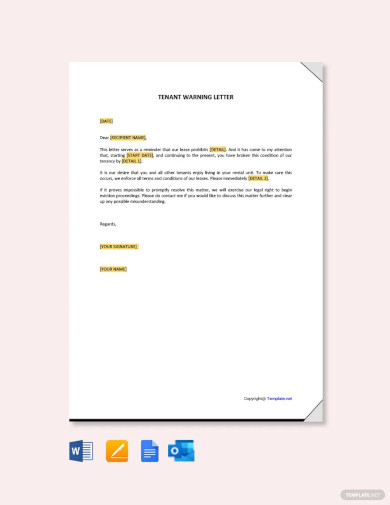
Tenant Warning Letter Template
download now -
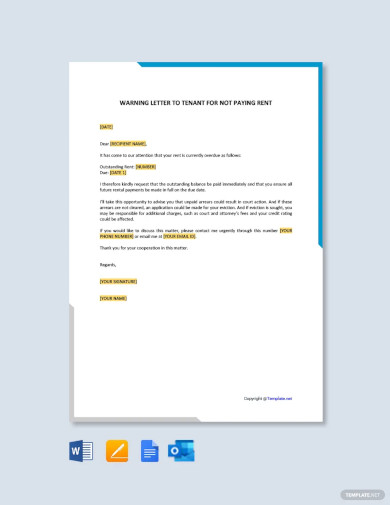
Warning Letter to Tenant for not Paying Rent Template
download now -
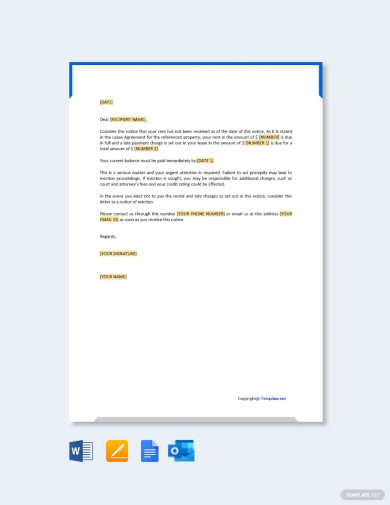
Warning Letter to Tenant for Late Payment Template
download now -
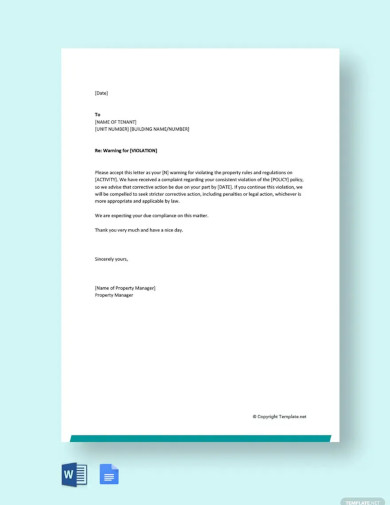
Warning Letter to Tenant for Violations Template
download now -
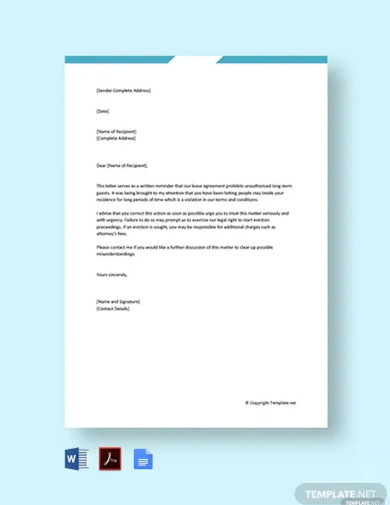
Landlord Warning Letter To Tenant Template
download now -
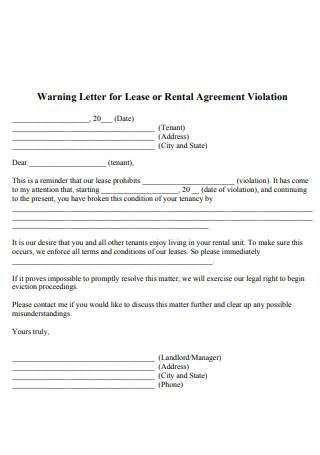
Sample Warning Notice to Tenant Letter
download now -
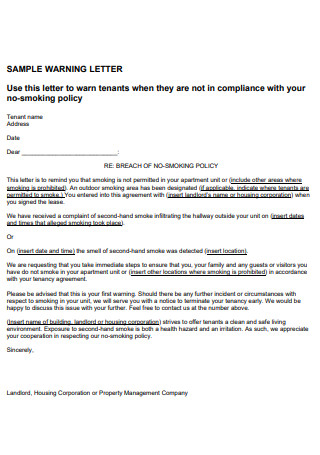
Behaviour Warning Notice to Tenant Letter
download now -
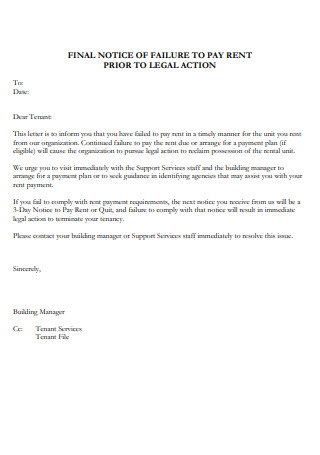
Tenant Warning Letter Failure to Pay Rent
download now -
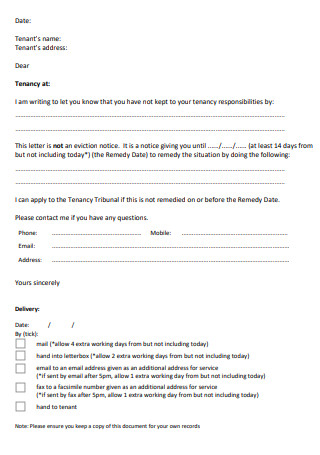
Tenant Cleanliness Warning Letter
download now -
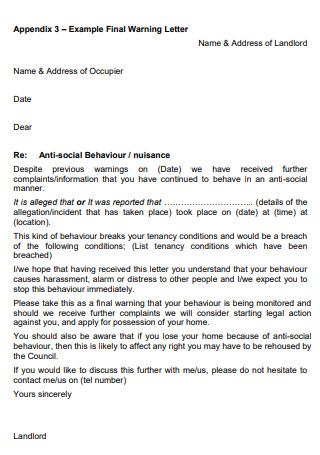
Tenant Property Warning Letter
download now -
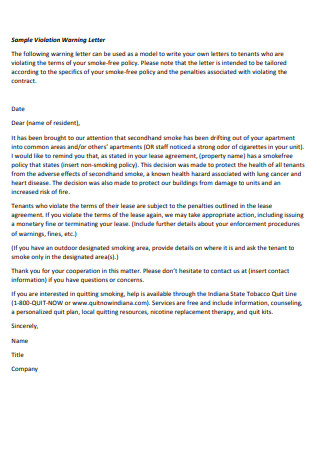
Tenant Violating Warning Letter
download now -
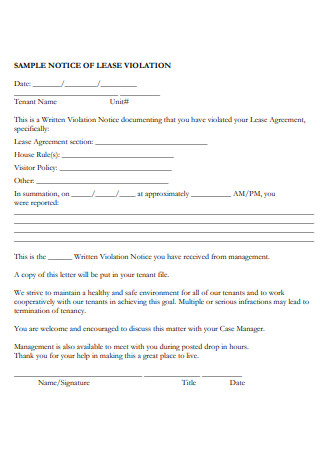
Tenant House Lease Agreement Violation Warning Letter
download now -
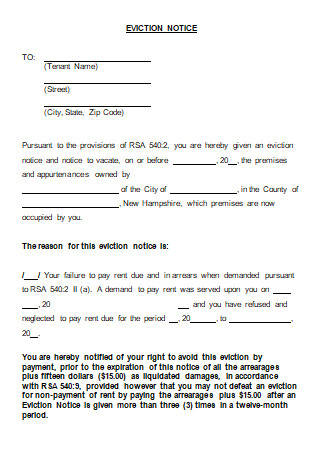
Sample Tenant Eviction Warning Letter
download now -
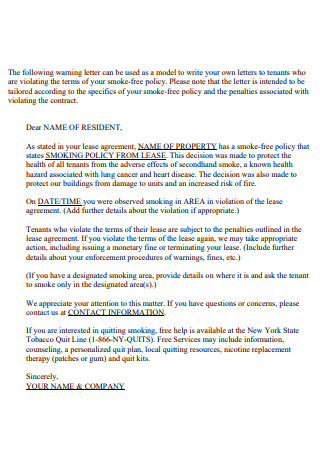
Tenant Parking Warning Letter
download now -
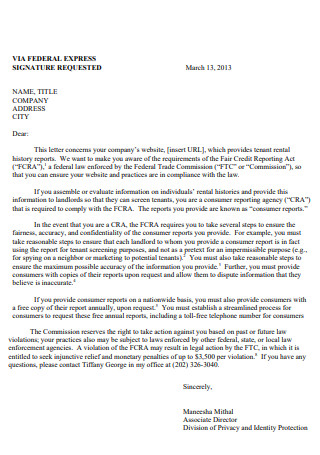
Tenant Landlord Rental Warning Letter
download now -
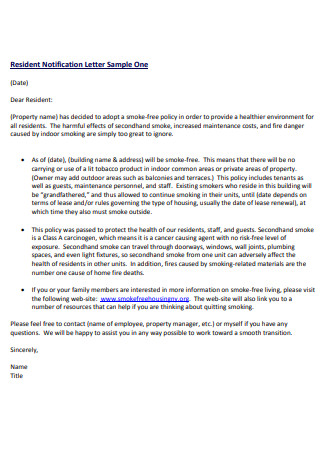
Tenant Payment Warning Letter
download now
FREE Tenant Warning Letter s to Download
15+ SAMPLE Tenant Warning Letter
What Is a Tenant Warning Letter?
Types of Tenant Warning Letters
Rental Policies to Watch Out For
How To Make a Tenant Warning Letter
FAQs
What Is the Purpose of Sending a Tenant Warning Letter?
As a Tenant, Can I Be Forcibly Evicted?
Should I Send a Complaint to My Landlord?
What Is a Tenant Warning Letter?
A tenant warning letter is a printed document sent by the landlord informing the renter of violations of building rules, any property damage, complaints from other tenants, or disturbing behaviors. These letters could be used as a warning letter for a tenant who has not paid their rent, or as a lease violation warning letter or behavior warning letter that can be used as an initial warning for first violations or as the final strike before being issued with an eviction warning letter. However, these warning letters could also serve as a notification in circumstances where building maintenance checklists or room inspection checklist are scheduled, and the consent of residents is required. It is also to give them time to prepare for any noises that may be caused by building maintenance.
You don’t want to be the recipient of an eviction notice, but if you consistently ignore all of the warning letters, cause enough disruption, and strive to fulfill your own damage checklist, your landlord will eventually issue you the eviction notice. However, there are ways to respond to an eviction notice, and the Civil Law Self-Help Center made steps to advise residents on what they can do when they received an eviction notice.
Types of Tenant Warning Letters
As a tenant, you may be interested in learning the particular purpose of the warning letter you received. Receiving an unclear warning letter may lead to greater confusion if a right resolution is not found. That is why you should be aware of the type of warning letter you may receive from your landlord. Here are a few examples:
Rental Policies to Watch Out For
As a tenant, one of the most important things to be aware of and keep an eye out for are any specific policies that may be included in your lease, as these policies may result in your eviction. Here are some specific policies to keep a close eye at.
How To Make a Tenant Warning Letter
As a landlord, you must ensure that you and your renter have committed to follow any lease terms through to the end. In the event of a complaint or a violation, delivering a tenant warning letter may not be avoided. So, here are the tips on what contents you can put when writing your tenant warning letter:
Tip 1: Intended Address
To avoid unnecessary conflicts once a tenant receives a letter, make sure it is delivered to the correct tenant in the first place. Because messing up the addresses may cause confusion or cause some people to respond aggressively. And, while you’re waiting for a response which might not come since the individual who received the warning is aware of what they didn’t violate and might not be so kindly inform you of the mix up. To minimize misunderstandings, make sure you know who exactly will be receiving the message.
Tip 2: The Reason
It’s vital to be explicit with the tenant about what specifically they violated or were warned about. A person who has not been paying their rent would like to know if they are required to vacate the premises in advance or if they will be forcibly evicted. State the cause for any warning letter, whether it is for overdue rents or a complaint notice; it is ideal if the tenant knows exactly what they have to work with. That is the major purpose of warning letters in the first place, to provide that chance to either redeem themselves by making adjustments or, if it is required for the tenant to move out, to give them a warning in order to prepare.
Tip 3: Remind the Policies
It is better to remind them of the guidelines once you have mentioned the cause for the warning letter. It may appear repetitive, but one can never be too sure. Assume they now understand the cause, but they may also want to know the precise clause they have violated. It should also warn you of any loopholes they might exploit, and as a tenant, it would serve as a firm reminder of what should be followed once more. Although the agreement was signed, time flies fast and it is possible that it was forgotten, especially if the regulations are not publicly displayed for them to read every day; it might simply be kept in the back of their minds and ignored. So, it’s best to remind them of the limitations and their rights as renters so that they don’t repeat the mistake in the future.
Tip 4: The Consequence
Laws are obeyed because there are penalties for breaking them. Consequences that could range from minor to severe. Contracts and agreements, similarly, have their own set of requirements to obey. Unintentionally breaching a contract or violating an agreement is something no one wants to do. So, once you’ve reminded the renter of which clause they’ve violated, it’s critical to spell out the potential repercussions. Is there going to be a fine? What about extra charges? Or possibly an eviction notice. The gravity of any offense should be reflected in the penalty. Giving that option to redeem or rectify oneself by stating the consequence may make everyone’s life easier, especially a tenant.
FAQs
What Is the Purpose of Sending a Tenant Warning Letter?
It is your responsibility as a landlord to tell your tenants of their issues and provide them the opportunity to address them. Serving a warning in advance would be suggested since there might be an instance where you have to remove them or before you file any lawsuit and avoid litigation due to unlawful eviction. A warning letter would also be an excellent chance to remind your renters of the policies they agreed to when they signed their lease. And the letter would offer them the opportunity to not repeat the offenses in the future.
As a Tenant, Can I Be Forcibly Evicted?
Eviction would need a lawsuit. However, your landlord can give you a warning to move out as a result of multiple instances of missed rent payments, or severe damage in the properties, or repeated violations in the agreed contract. In the case you decide not to move out or unable to negotiate with the landlord, they can file an eviction lawsuit against you and in the case, they win, you will have to be forcibly moved out. That is why eviction warning letters exist, in order to give chance to tenants to pay their dues or incurred fines or perhaps asked for another chance. So yes, you can be evicted even though your tenancy has had yet to expire in the case your landlord wins the lawsuit.
Should I Send a Complaint to My Landlord?
Whether your concern is about your neighbors or your landlord, filing a complaint may help you resolve your problem. Why not, if the problem can be solved and is not just discrimination (racial, sexual, or against individuals with disabilities)? A sudden notice of rent increase, for example, would be unjustified if there was no clear rationale for it. So, file the complaint and see if the problem can be rectified. After all, you are the one who is paying for it.
Being a landlord is a challenging job. There are numerous things to be aware of while attempting to attract new renters. And now you even have to worry about sending warning letters. Not to worry! Use the sample tenant warning letters and templates above to make your job easier!
